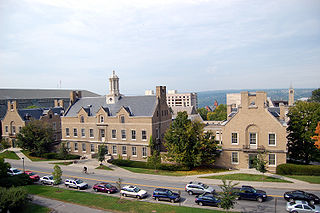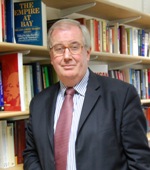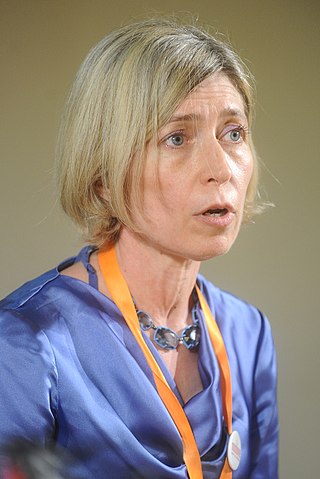Related Research Articles
A trade union or labor union, often simply referred to as a union, is an organization of workers whose purpose is to maintain or improve the conditions of their employment, such as attaining better wages and benefits, improving working conditions, improving safety standards, establishing complaint procedures, developing rules governing status of employees and protecting and increasing the bargaining power of workers.

Sidney James Webb, 1st Baron Passfield, was a British socialist, economist and reformer, who co-founded the London School of Economics. He was an early member of the Fabian Society in 1884, joining, like George Bernard Shaw, three months after its inception. Along with his wife Beatrice Webb and with Annie Besant, Graham Wallas, Edward R. Pease, Hubert Bland and Sydney Olivier, Shaw and Webb turned the Fabian Society into the pre-eminent politico-intellectual society in Edwardian England. He wrote the original, pro-nationalisation Clause IV for the British Labour Party.
Industrial relations or employment relations is the multidisciplinary academic field that studies the employment relationship; that is, the complex interrelations between employers and employees, labor/trade unions, employer organizations, and the state.

The New York State School of Industrial and Labor Relations at Cornell University (ILR) is an industrial relations school and one of Cornell University's four statutory colleges. The School has five academic departments which include: Labor Economics, Human Resource Management, Global Labor and Work, Organizational Behavior, and Statistics & Data Science.

Richard Barry Freeman is an economist. The Herbert Ascherman Professor of Economics at Harvard University and Co-Director of the Labor and Worklife Program at Harvard Law School, Freeman is also Senior Research Fellow on Labour Markets at the Centre for Economic Performance, part of the London School of Economics, funded by the Economic and Social Research Council, the UK's public body funding social science. Freeman directs the Science and Engineering Workforce Project (SEWP) at the National Bureau of Economic Research (NBER), a network focused on the economics of science, technical, engineering, and IT labor which has received major long-term support from the Sloan Foundation.
The School of Labor and Employment Relations (LER) is a graduate school at the University of Illinois at Urbana–Champaign. Founded in 1946, the school is the second oldest labor and industrial relations school in the nation. Students at Illinois can earn a Master of Human Resources and Industrial Relations or a PhD in Industrial Relations. The school focuses on the MHRIR program. Until August 2008, LER was known as the Institute of Labor and Industrial Relations. In spring, 2015, the master's program expanded to accommodate an online program targeted to working professionals.

Odd Arne Westad FBA is a Norwegian historian specializing in the Cold War and contemporary East Asian history. He is the Elihu Professor of History and Global Affairs at Yale University, where he teaches in the Yale History Department and in the Jackson School of Global Affairs. Previously, Westad held the S.T. Lee Chair of US-Asia Relations at Harvard University, teaching in the John F. Kennedy School of Government. He has also taught at the London School of Economics, where he served as director of LSE IDEAS. In the spring semester 2019 Westad was Boeing Company Chair in International Relations at Schwarzman College, Tsinghua University.

Michael E. Cox is a British academic and international relations scholar. He is currently Emeritus Professor of International Relations at the London School of Economics (LSE) and Director of LSE IDEAS. He also teaches for the TRIUM Global Executive MBA Program, an alliance of NYU Stern and the London School of Economics and HEC School of Management.
Richard Hurd is a professor of labor relations emeritus and former director of Labor Studies at the Cornell University School of Industrial and Labor Relations.
Charles Heckscher is a professor in the Department of Labor Studies and Employment at Rutgers University, and director of the Center for Workplace Transformation at Rutgers.
David William Soskice, FBA is a British political economist and academic. He is currently the LSE School Professor of Political Science and Economics at the London School of Economics.
LSE IDEAS is a foreign policy think tank at the London School of Economics and Political Science. IDEAS was founded as a think tank for Diplomacy and Strategy in February 2008, succeeding the Cold War Studies Centre founded in 2004. It is led by Professor Christopher Alden and Professor Michael Cox. LSE IDEAS has been ranked as the top European university-affiliated think tank and the number two university-affiliated think tank in the world.

Stephen J. Silvia is a professor at American University's School of International Service and an affiliate professor in American University's Economics Department. He teaches international economics, international trade relations, and comparative politics. He is a noted expert on the German economy, in particular, on German labor markets and industrial relations. He has written about comparative industrial relations, European Union economic policy, and comparative economic policy, with an emphasis on Germany and the United States.
Masahiko Aoki was a Japanese economist, Tomoye and Henri Takahashi Professor Emeritus of Japanese Studies in the Economics Department, and Senior Fellow of the Stanford Institute for Economic Policy Research and Freeman Spogli Institute for International Studies at Stanford University. Aoki was known for his work in comparative institutional analysis, corporate governance, the theory of the firm, and comparative East Asian development.
Industrial democracy is an arrangement which involves workers making decisions, sharing responsibility and authority in the workplace. While in participative management organizational designs workers are listened to and take part in the decision-making process, in organizations employing industrial democracy they also have the final decisive power.
Greg Bamber is a British-Australian academic, researcher and writer. He is a professor at the Department of Management, Monash University, Melbourne, Australia. He is also Director, International Consortium for Research in Employment & Work (iCREW), Centre for Global Business, Monash Business School.
Sanford M. Jacoby is an American economic historian and labor economist, and Distinguished Research Professor of Management, History, and Public Policy at University of California, Los Angeles. He is known for his studies of the transformation of work in American industry, corporate governance, Japanese management, and welfare capitalism.
Gary Sheldon Fields is an American economist, the John P. Windmuller Professor of International and Comparative Labor and Professor of Economics at Cornell University. Fields has performed extensive research in labor economics and development economics, in particular labor mobility, which was rewarded with the IZA Prize in Labor Economics in 2014.

Oriana Bandiera, FBA is an Italian development economist and academic, who is currently the Sir Anthony Atkinson Professor of Economics at the London School of Economics. Her research focuses on development, labour, and organisational economics. Outside of her academic appointment, she is co-editor of Econometrica, and an affiliate of the Centre for Economic Policy Research and Bureau for Research and Economic Analysis of Development. A fellow of the Econometric Society and the British Academy, she received the Yrjö Jahnsson Award in 2019, an award granted annually to the best European economist(s) under the age of 45.
Jack Barbash (1910–1994) was a labor economist best known for helping negotiate the merger of the Congress of Industrial Organizations (CIO) back into the American Federation of Labor (AFL) to form the AFL–CIO in 1955.
References
- 1 2 3 4 5 6 7 8 "LSE CV Prof Frege".
- 1 2 "Management Department".
- ↑ Frege, Carola Maria (1996). Workplace relations in East Germany after unification: Explaining worker participation in trade unions and works councils (PhD). London School of Economics and Political Science. Retrieved 3 June 2021.
- ↑ "LERA".
- ↑ "Taskforce".